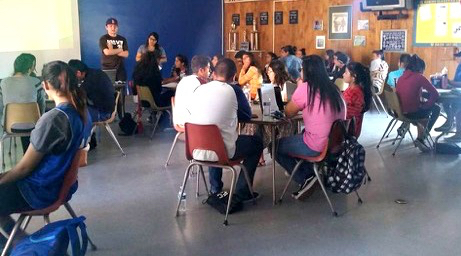I have worked in education for the last six years. Growing up, I was fortunate to have my father serve as a positive role model who guided me in the right direction. I also counted on the support of a few teachers, who saw potential in me way before I recognized it myself. In high school, I fit in and felt like I could contribute to class discussions; I was comfortable speaking up and facilitating conversations amongst my peers.
When I started my college journey, I faced a new reality. During my first class discussions, I felt useless and as if there was nothing I could contribute, as I was struggling to understand the words some of my classmates used and realized how unprepared I was for this new learning environment. The more overwhelmed I felt, the more I pulled myself back from any environment that would put me in the spotlight. My once confident personality seemed to be squashed by the fact that I had not been challenged as a high school student and was forced to play catch up. Ironically, it was the struggle of working my way up that led me to become passionate about working with under-resourced communities. It was finding myself drowning, and that feeling motivated me to learn to swim so that one day I could teach others to swim too.
After some career changes, I found my path in education. I worked as a substitute for three years before taking my first role as a Spanish teacher at a high school in a predominantly Latino community. After a year, I realized that I needed to seek opportunities elsewhere as the high school administration and the culture of the school were not a fit for me. Eventually I made a move to work at a local school district as a substitute teacher and have been working in this capacity for about a year now. In serving in this current role, I am reminded of why I first came into this realm.
Perhaps it is the fact that I am often seen as the outsider coming in to simply fill a vacancy or the fact that I am not seen as the authoritative figure, but I have found that serving in the “substitute role” after having taught my own classes, has given me the opportunity to have access to a different perspective. I lead by experience. As a high school student, all I wanted was to be heard. When I felt ignored or like my voice didn’t matter, I rebelled. In carrying this wealth of experience, I enter every space with one priority in mind: creating a safe space that allows students to feel engaged.
After the recent presidential election, I have had many students open up about their feelings of being left in the dark and feeling unengaged. While I do my best to make myself accessible and lead discussions about real-world issues and current events whenever possible, I know that it’s not enough. I usually sub a class for a week at a time and on a more regular basis, come in for one day assignments. I make it a goal to make the best of any one-day assignment I receive as I want my students to feel like their opinions and their voices matter. I want them to feel validated and I want them to have a space to share thoughts and also acquire new information. I am currently subbing high school freshmen and sophomores, and the reality is that they are misinformed about what’s actually happening. I don’t want to assume that they have all their information wrong, but I do believe that they would benefit from more structured, intentional seminars that can help them cope with our country’s current status as well as help them better understand their place and their potential to serve as advocates.
We are living in a tumultuous time in history. What are we doing to engage our youth? I know there are numerous responsibilities on teachers’ plates and and that there are many academic standards to cover but will taking five minutes to check in and do a quick update on relevant news really count as a waste? If we are helping mold the next generation of leaders, shouldn’t engaging them in real conversations about what’s happening in this country be a key component of their development as active citizens?
Lets do our part to mobilize our most powerful assets, our students. As our current president continues to make the wrong moves, students are the first group we all worry about; so why not commit ourselves to building their resilience rather than creating bubbles around them?
Isaac Alvarado
Latest posts by Isaac Alvarado (see all)
- Sección de Maestros: La Batalla Entre Ser Amable y Estricto en el Aula - June 9, 2017
- Teacher’s Corner: The Battle Between Being Nice and Strict in the Classroom - June 8, 2017
- ¿Quieres Ayudar a Construir la Resiliencia en Nuestros Estudiantes? Comencemos por Incluir Los - February 16, 2017
- Want to Help Build Resilience in Our Students? Start by Engaging Them - February 16, 2017

